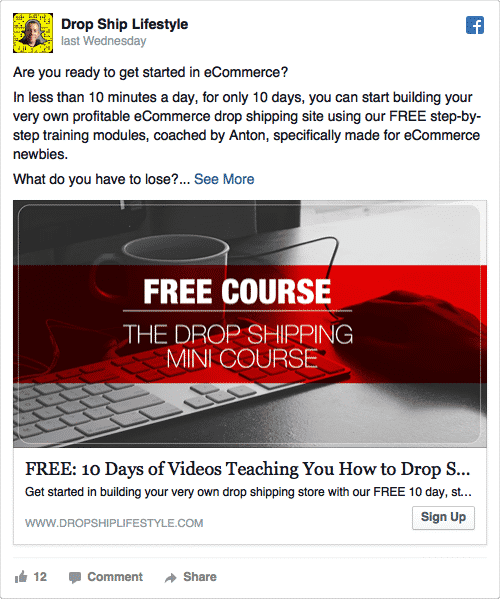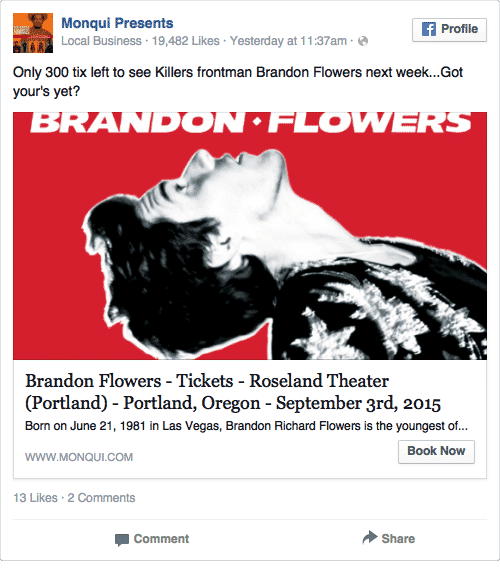Marketing based on the psychology of human behavior can be a powerful thing. When we peel away layers of emotion and get to the deep motivations that make people do or not do certain things, we learn that people are very susceptible to suggestions.
It isn’t any wonder that the best marketers are the ones who study and understand what makes people tick. Delve into the psychological studies we have outlined here, highlighting principles that marketers around the world have used since the beginning of time.

To help your Facebook marketing campaigns reach even further than these principles can take you, consider buying social signals (like Facebook followers), which will help you gain maximum exposure, and appear like more of an authority in your niche. Having many followers is a key psychological principle you’ll learn about below, skip ahead to ‘social proof’ if you’re curious!
Reciprocity Effect
Have you ever felt compelled to Like a post on Facebook simply because the person who posted it Liked one of your own? Or perhaps you’ve been in a situation where you replied to and Liked a comment on your post, and then the friend who commented Liked your reply back? Psychologists have a name for this and it’s called Reciprocity.
The Reciprocity Effect is a social rule that governs us all and makes us repay in kind whatever it was that was given to us. According to psychologist Robert Cialdini, the obligation to return the favor has been drilled into us as children such that when we don’t reciprocate any good turn done us, we feel uncomfortable and out of balance.
That’s how powerful Reciprocity can be and why it has found its way into the marketing strategies of many brands. On Facebook, you can use this aspect of psychology by giving away free samples or trials of your products or services, and anything else that can make your audience feel indebted to you.
You first need to break the barrier of mistrust put up by consumers wary of advertisers, so you shouldn’t ask for (or even give the impression of asking for) something in return.
Take a look at how Drop Ship Lifestyle used the Reciprocity principle in their Facebook advertising.

Foot-in-the-door Technique
The Foot-in-the-door Technique is a compliance approach to getting someone to agree to a large request by setting up that person to agree to a small request first. It’s a behavioral phenomenon characterized by a change in behavior, or what psychologists call “compliance.”
It operates on the theory that once you get your foot in the door, it will be harder for the other person to shut the door in your face – metaphorically.

The technique works beautifully in marketing because once your prospect complies, psychologists say he will subsequently behave in ways that, in his mind, will justify his earlier decision. For example, if you are raising funds for a charity event and your goal is to have people voluntarily commit their time and money, begin by asking them to donate a small amount of money first.
Because there’s no physical and very little emotional involvement, your prospects will likely say yes. However, because they’ve already made the decision to help, it will be easier to ask them for a larger donation later on. And once you show them how important their contributions are, they will justify their earlier decision as right and will continue to help in your cause.
Mere-Exposure Effect
The Mere-Exposure Effect, also called the Familiarity Principle, is based on the theory that people respond positively to things which are familiar. This means that the more we are exposed to something, the more we like that something as we grow familiar.
This effect works with both visual and auditory stimuli. Advertise to the senses and mention or show your brand name and logo as is reasonable in your ads. Update your Facebook channel consistently and aim to make your posts viral to reach as wide an audience as possible. Consider making a sweet logo as well, or a jingle that people can associate your brand with.
Consider how KitKat creatively tapped into a trending topic for some brand exposure on Facebook at a time when the whole word was probably online.

Social Proof
It’s human nature to follow others. In marketing, this is called social proof. Social proof is a type of social conformity. When people want to be right and do the right thing, they’ll automatically adopt the actions of others, especially when there’s a huge crowd involved.
This phenomenon, when used as a marketing tool, can be pretty powerful. One particularly effective form of social proof is “Wisdom of the Crowd.” When people rationalize that something must be right if there are a lot of people doing it, you have the perfect opportunity to harness this power and give your Facebook marketing efforts a boost.

For instance, if you buy Followers and other forms of social signals, that high number of bought followers or likes will tell the world you must be someone worth following. You don’t have to prove you’re an authority in your field because your massive following will speak for you, but you’ll still need some solid content or products to back up that reputation.
This is, in many ways, how Apple’s iPhone took the market by storm. When it was first released in the US and hundreds of customers lined up outside the stores nationwide, social proof was a huge asset for them. When virtually everyone started sporting an iPhone and looking super cool, social proof was working for them still. People buy them because, surely, the massive crowd of admiring customers could not be wrong.

Social Identity Theory
The Social Identity Theory states that people define their “self” according to the group they belong to. Groups like social class, football team, school affiliation, company we work for, and others, provide us with self-esteem and a sense of belonging in the social world.
The central premise of the theory is that we seek to improve our self-image by finding something negative in groups we don’t belong to. When we elevate the status of our group, we also enhance our self-image. This gives light to how prejudice and discrimination form. When we say, for example, “the Pittsburgh Steelers are the best team and the Baltimore Ravens are a bunch of morons” we create a division and a world where it is ‘us’ versus ‘them.’
In marketing, you can make the most of this model by branding your company in a way where you also create an “enemy” your customers can disassociate themselves from.
A definitive example is Apple’s Mac versus Microsoft’s Windows. Both brands have a fiercely loyal customer base who, more often than not, take a dig at each other for their choice of brand.

Scarcity Heuristic
If you’ve ever felt the urge to buy something immediately, ‘while supplies last,’ then you know what it feels like to be subjected to the power of the Scarcity Heuristic. In psychology, the Scarcity Heuristic is defined as a mental shortcut that places value on objects based on how easy or difficult it is to acquire them. In other words, the more difficult it is to get something, the more we value it. The more rare, uncommon and exclusive a product is, the more we want it. On the other hand, more common things are valued less. Collector markets thrive on this.
When marketers suggest the scarcity of a product, we immediately put more value on it as consumers. Take Facebook in its early days, when it was only available to a “select few” in an ‘invite only’ phase. Facebook was slowly rolled out, first to Harvard students, then to all Ivy-leaguers, then to all college students nationwide, until it was opened to the rest of the world in September 2006. We know from the way the world embraced Facebook that the approach worked.
Use the psychology of scarcity in your marketing, not just on Facebook but on your other social media channels, too. You can play it up by introducing thoughts of what they might miss if they don’t buy or by creating urgency in your language. Take a look at how Monqui Presents created a sense of urgency in their ad.

Psychological Marketing Works!
Understanding human behavior, including the most powerful social rules that govern our actions and behavior, has many benefits. Applied to marketing, it can propel a brand to success as sales surge forward.
Study these principles, and learn how you can adapt them for your purposes. Remember, you can kickstart your growth and up your social proof by purchasing Facebook followers, as well as followers for other platforms. Combine them with a solid strategy, and you’ll be set up for success. Transform the way you market to your audience and use psychology in your advertising strategies. Because it works!

